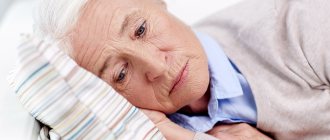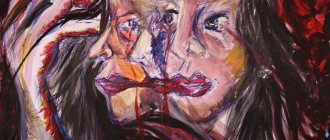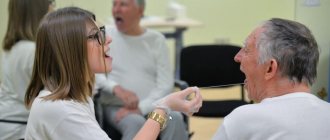- home
- Helpful information
- Elderly care
- Sleep disorders in older people
35% of older people have problems sleeping. The older you are, the more often such disorders occur. These may include difficulty falling asleep, waking up early, or interrupted or shallow sleep. A person may be disturbed by vivid, unpleasant dreams, he may experience fear of the night or dreams, and may not feel rested in the morning. Problems gradually accumulate: anxiety and tension increase, which makes it more difficult to fall asleep, and the period of night rest lasts less. To normalize the regime, you need to determine the reasons why it was violated.
Sign up for a consultation
Why do sleep problems occur?
There are two categories of violations.
Primary. Most often this is sleep apnea, which is manifested by short breath holds. Because of them, a person wakes up and then cannot fall asleep. The older you are, the more often such disorders occur. Their risk is higher in overweight people who are prone to snoring for a long time. In other cases, myoclonus (convulsions, muscle twitching), restless leg syndrome (trembling) interferes with sleep.
Secondary. They arise due to neurological, mental disorders, and some somatic diseases. These could be heart problems (frequent attacks of angina at night), bronchial asthma or COPD, pain syndromes, endocrine pathologies. If sleep disorders are associated with physical well-being, the person sleeps superficially, often wakes up, but can then fall asleep. With neurological problems, difficulties may arise both in falling asleep and in maintaining sleep. In two thirds of cases, secondary disorders are associated with mental disorders: depression, neuroses, dementia, high levels of anxiety, etc.
More often than not, sleep problems have several causes. For older patients, this may include an iatrogenic factor—taking medications that cause insomnia. Among these drugs are antidepressants, nootropics, antiarrhythmics, antihypertensives, bronchodilators, etc. Insomnia can be caused by their overdose or side effects.
The task of a gerontologist, psychiatrist or therapist when working with an elderly person is to collect as much information as possible about how insomnia manifests itself and what features it has in a particular case.
It is important to determine its root cause. In diagnosis, it matters what time a person falls asleep, whether he wakes up at night, how long he sleeps continuously, what his dreams are like, and how he himself assesses sleep productivity. The nature of the disorders and their possible causes allow us to select the most effective method of therapy. You have questions?
We will call you back within 30 seconds
or call the number
Clicking the "Submit"
, you automatically consent to the processing of your personal data and accept the terms of the User Agreement.
Sleep duration depends on age
We need quality sleep. At night, mainly from 23.00 to 01.00, a vital hormone - melatonin - is produced. It regulates circadian rhythms, stimulates the immune system, and has antioxidant properties.
Both physical and psycho-emotional comfort are important for a person’s health. Such harmony can be created if all phases of sleep are present in the correct percentage. If the duration of sleep decreases and the structure of the phases is disrupted, then amyloid protein forms and accumulates in the blood.
As people age, their sleep deteriorates due to a reduction in the deep phases of slow-wave sleep, during which anabolic processes and brain detoxification occur. Aging and senile dementia are caused by the accumulation of amyloid plaques in the brain of an elderly person, which ultimately reduces life expectancy. In addition, amyloid destroys the walls of blood vessels, causing heart disease.
Household members consider the early awakening of elderly relatives almost a whim or, even worse, a pathology: they say that an out-of-mind grandmother wakes up early and wakes us up. Doctors explain that at different ages people have different needs for sleep, and you need to come to terms with this.
Oksana Belan:
— If a small child sleeps until 18 o’clock, then a teenager sleeps 9-11. 7-8 hours are enough for an adult, and up to 6 hours for an elderly person, since the need for sleep duration decreases with age.
By nine o'clock in the evening, older people, as a rule, are already tired and go to bed. If you managed to fall asleep immediately, then it is logical to assume that you will wake up at 3–4 o’clock in the morning. Or evening fatigue drives you to bed, and sleep does not come for a long time. In both the first and second cases, the elderly person does not know what to do while lying in bed in the dark. What to do?
The first is to accept the fact that the need for sleep duration has changed. To avoid going to bed early, it is recommended to get the rest your body needs during the day to replenish its strength. But without falling asleep. If an elderly person falls asleep for half an hour before or after lunch, his night's sleep will decrease accordingly. You can only fall asleep during the day if this leads to improved night sleep.
Secondly, come up with an activity for yourself so that aimless wakefulness in bed is not painful. If you prefer to watch TV, then these should be calm programs that do not evoke strong emotions, for example, the “Culture” channel or educational programs, television programs about animals and nature. The main thing here is not to get excited or get carried away. You can listen to quiet classical music. The same applies to books. By the way, many people come to read prayers with age. This type of activity is calming in nature due to its calming monotony. If you do not disturb your household, you can quietly get up and do something around the house.
Often older people build their schedule this way. They go to bed early, wake up at three or four in the morning, and can prepare breakfast. If there is an appetite, eat immediately; if not, leave it until the morning. Someone wipes the dust, waters the flowers, does hygiene procedures that they didn’t have enough energy for in the evening. Then, as a rule, they feel the need to take a nap and lie down for an hour and a half, which helps them feel great until the evening. And that's okay. It is important to understand and accept your new rhythm. For older people, the number of hours of sleep is calculated not per night, but per day.
Non-drug treatment of insomnia in older people
At the first stage, they try to correct sleep disorders without using sleeping pills. To do this, older people are advised to:
- go to bed and get up in the morning at the same time, adhere to a strict regime. Going to bed should begin only after drowsiness appears;
- If you can’t fall asleep within 15-20 minutes, you can’t stay in bed: it’s better to get up, move to a chair or another room until you want to sleep again. If possible, the bed should be associated with sleep, and not with insomnia;
- You shouldn't sleep during the day. If severe drowsiness occurs, the recommended rest time is no more than 30 minutes;
- in the evening it is better to refrain from rich, high-calorie food, too strong impressions, and drinking tonic drinks;
- Sleep hygiene is important. The bed linen should be fresh, the mattress and pillow should be comfortable. It's better if the bedroom is cool. Curtains - thick, not letting in light;
- spend the evening hours quietly, doing the same activities. You can use daily “rituals” to relax: take a shower, read before falling asleep, drink a glass of milk, etc.;
- increase physical activity in the morning. Muscle fatigue improves the quality of rest at night. After lunch or in the late afternoon, you can go for a long walk;
- after lunch, exclude drinks and foods containing caffeine or other tonics (tea, coffee, chocolate, sweets, cocoa, etc.);
- stop drinking alcohol. Alcohol does not replace sleeping pills: “drunken” sleep is superficial and does not provide complete rest.
Diagnosis of insomnia
Diagnosis of the disease includes the following activities:
- assessment of the patient’s chronobiological type (is he a morning person or a night owl, how many hours of sleep does he need for proper rest);
- taking into account the peculiarities of culture and traditions in the patient’s place of residence (for example, in countries with hot climates, afternoon naps - siesta - are widespread);
- accounting for professional activities (for example, a person can work as a watchman at night or on a daily basis);
- psychological examination of the patient;
- polysomnographic study - is carried out to assess the structure of sleep and may include several techniques (electrooculography, electromyography, electroencephalography and a number of others).
Insomnia medications for older people
Medicines are used only if compliance with general recommendations, correction of diet and nutrition do not produce results. Sleeping pills are used with extreme caution:
- only with diagnosed insomnia (sleep disturbances recur for a long time and negatively affect the patient’s physical and mental state);
- the minimum effective dosage is prescribed;
- therapy is intermittent. Taking the drug is allowed 2-3 times a week (not daily). Courses of treatment are short, do not exceed 3-4 weeks;
- monitoring the condition while taking the drug, gradually reducing the dosage immediately after receiving the result.
If sleep disturbances are secondary, caused by some underlying disease, therapy is aimed primarily at treating it. For primary disorders, medications are prescribed taking into account exactly what problem is causing insomnia. For muscle spasms, tranquilizers can be effective; for apnea, cyclopyrrolones are more often used.
When prescribing any psychoactive, sedative and other drugs to elderly patients, the dosage is reduced as much as possible, taking into account age and health status. You cannot independently increase the dosage or duration of the course - this is dangerous for the development of drug dependence and a negative impact on cognitive functions. With long-term continuous use of certain sleeping pills, concentration, attention, and thinking may decrease.
Decoctions and infusions of rhizomes, stems, flowers and fruits of medicinal plants
The compositions of the preparations include ingredients with pronounced sedative properties . They calm the nervous system, relieve stress and remove irritability. Regular intake of natural decoctions allows you to get rid of fearfulness and alleviate the condition of people with obsessive fears and phobias. Infusions prepared according to the following recipes can fully prepare the body for sleep :
- Motherwort five-lobed (3 parts), cudweed (3 parts), common heather (4 parts), valerian root (1 part). Pour a liter of boiling water over 4 tbsp. mixture, leave for 10-12 hours, strain. Take small sips every hour throughout the day.
- Peppermint leaves (1 part), hop heads (1 part), chamomile flowers (2 parts), lemon balm leaves (2 parts), valerian officinalis roots (2 parts), buckthorn bark (2 parts). Add 1 tbsp to 1 cup of boiling water. collection Take 1-2 glasses before bedtime.
- Veronica officinalis herb (1 part), fragrant violet herb (1 part), barberry fruits (1 part), lavender flowers (1 part), lemon balm leaves (1 part). 1 tbsp. pour a glass of boiling water over the mixture. Leave until completely cooled. Drink 1-2 glasses in the evening.
- Peppermint leaves (2 parts), lavender flowers (2 parts), valerian officinalis roots (3 parts), chamomile flowers (3 parts). Infuse 2 tbsp in a glass of boiling water. collection takes about 15 minutes. Drink in small sips throughout the day.
- Chamomile flowers (1 part), peppermint leaves (1 part), valerian officinalis roots (1 part), caraway fruits (1 part), fennel fruits (1 part). For 10 g of collection, pour 1 cup of boiling water. Infuse in a water bath, maintaining a boil for about half an hour. Cool (no more than 10 minutes) and strain. Squeeze out the sediment and dilute the resulting broth with boiled water to the volume of a full glass. Drink 1-2 glasses in the morning, 1 glass in the evening.
- Motherwort (5 g), thyme (5 g), calendula flowers (5 g). Boil 10 g of the mixture in 200 ml of water for 10-15 minutes. Leave for no more than 1 hour. Take 100 ml with honey before bed.
- Oregano herb (10 g), valerian roots (5 g). Boil 10 g of collection in 100 ml of water for 10-12 minutes. Leave for an hour. Drink 100 ml at night.
- Peppermint leaves (10 g), valerian roots (10 g), motherwort (10 g), mistletoe (10 g), hawthorn flowers (10 g). Infuse 1 tbsp in 200 ml of boiling water. collection within half an hour. Take 1 glass in the morning and evening.
- Peppermint leaves (20 g), valerian officinalis roots (10 g), hop cones (20 g), three-leaf watch (20 g). Infuse 1 tbsp for half an hour. mixture in 200 ml of boiling water. In the morning, afternoon and immediately before bed, take 100 ml.
- Peppermint leaves (30 g), motherwort (30 g), valerian officinalis roots (20 g), hop cones (20 g). Pour 10 g of collection with a glass of boiling water. Maintain a boil in a water bath for 15 minutes. Cool, strain and squeeze. Dilute with water to the original volume. Take half a glass of decoction three times a day.
One-ingredient recipes
If you have an individual intolerance to some of the ingredients in the preparations, you can use one-component products:
- Roots of valerian officinalis . Add 1 tbsp to 1 cup of boiling water. roots and boil for about 15 minutes. Leave for 10 minutes and strain. Take 1 tbsp. three times a day.
- Common oregano . Add a glass of boiling water to 2 teaspoons of herbs. Leave for 20 minutes. Drink the decoction warm, half a glass 3-4 times a day before meals.
- Red elderberry . Pour 1 tbsp with a glass of boiling water. elderberries. Boil for 15 minutes, leave for 30 minutes. Take 1 tbsp. 2-3 times a day.
- Hawthorn fruits . Add 2 tbsp to one and a half cups of boiling water. dry crushed fruits. Drink half a glass 3 times a day before meals (30 minutes before).
Sleep disorders and dementia
In senile dementia and other delirious disorders, severe insomnia develops. Elderly people themselves do not complain about it, but for nearby relatives such sleep disturbances become a serious problem. A person does not fall asleep himself, does not allow others to sleep, his sleep and wakefulness patterns change. Therapy in this case requires a special approach.
In dementia, problems with sleep manifest themselves as a violation of the daily routine: during the day a person experiences drowsiness, and closer to night anxiety and agitation increase. The patient may try to leave home, collect things, tie knots, experience hallucinations, etc. It is dangerous to use tranquilizers in this condition: they can worsen health and make the patient even more restless.
It is possible to use antipsychotics and correct previously prescribed drug therapy. Medical doctors recommend changing your regimen so that the bulk of your activity occurs during the daytime hours. This will help restore the circadian rhythm, control it, and reduce the frequency of insomnia episodes.
Order a visit from a gerontologist. Experienced doctors. Treatment in a hospital or at home. 24-hour service in Moscow and the region. Professional, anonymous, safe.
- Caring for the elderly with mental disorders
- Psychiatrist help at home
- Types of rehabilitation for the elderly and disabled
- Advantages of our hospital
- How to choose a good nursing home
- Care for the elderly: in a hospital or at home
- Problems of caring for the elderly
- Who should you leave a person with dementia with if you need to leave?
- Help from a gerontologist in caring for an elderly person
- Sleep disorders in older people
- Features of caring for a bedridden patient
- Features of caring for older people with mental disorders
- Hygiene in old age
- Establishing guardianship for a patient with dementia
- Rules for communicating with an elderly person
- 10 Frequently Asked Questions About Nursing Homes: Everything You Need to Know
Relaxing baths
Water procedures have a beneficial effect on the body , calm the nervous system and prepare a person for sleep. To properly use this method of combating insomnia, several rules should be followed:
- The optimal temperature is 36 degrees. The water in the bathroom should not heat up more than 40 degrees.
- The last meal before the procedure is 2 hours. The bath should also be taken 2 hours before bedtime.
- The duration of the procedure is 15-25 minutes.
- Water should not cover the surface of the chest (in the area of the heart), which can impede blood circulation.
- You can add decoctions of medicinal plants (valerian root, pine needles and pine cones, fragrant hay) to the water.
Hawthorn
Recipe No. 1
What you will need: 1 tbsp hawthorn flowers.
How to take: place the flowers in a container and pour 1 cup of boiling water. It is necessary to insist. Take 20 drops (hot) before meals - 2 times a day.
Recipe No. 2
What you will need: 1 tbsp. crushed hawthorn flowers.
How to take: place the flowers in a container and pour a glass of boiling water. Take 1/3 glass – 3-4 times a day.
Recipe No. 3
What you will need: 1 tbsp. crushed hawthorn fruits or flowers.
How to take: place in a container and fill with 1 glass of vodka. Close the lid and leave for 7 days, strain. Take 20-30 drops before meals - 3-4 times every day.
Recipe No. 4
What you will need: 1 tbsp. crushed hawthorn fruits.
How to take: place the fruits in a container and pour a glass of boiling water. Leave on a hot stove for two hours; no need to boil. Strain and take 3-4 tbsp. – 3-4 times per knock.
Be careful with sleeping pills!
It’s easier, of course, to go to the pharmacy and buy all kinds of sleeping pills, but before you do this, it’s worth remembering the adverse reactions:
- some types of sleeping pills depress the nervous system and can disrupt physiological functions;
- it is necessary to take into account the compatibility of sleeping pills with other medications, and a lot of them are prescribed to older people;
- Due to the fact that the body in old age no longer absorbs incoming substances so energetically, the use of sleeping pills can cause lethargy during the day.
Statistics show that when an older person uses drugs to help them fall asleep, the risk of death increases.
Treating insomnia in the elderly with proven folk remedies is much safer, and their effectiveness is often no worse than chemical drugs.
Precautionary measures
The most effective recommendation for precautionary measures is to consult a doctor and do not self-medicate. Buying sleeping pills indiscriminately is not only ineffective, but also life-threatening. It is unlikely that you will buy a suitable, safe medicine on your own that will give you sound sleep. Unsuitable medications can cause serious disturbances in the functioning of the nervous, cardiovascular systems, etc. Some medications can be life-threatening in old age.
In addition, with age, the possibility of addiction to sleeping pills increases. Doctors do not recommend taking one drug for more than 2 weeks. At the same time, fighting sleep in other ways.









